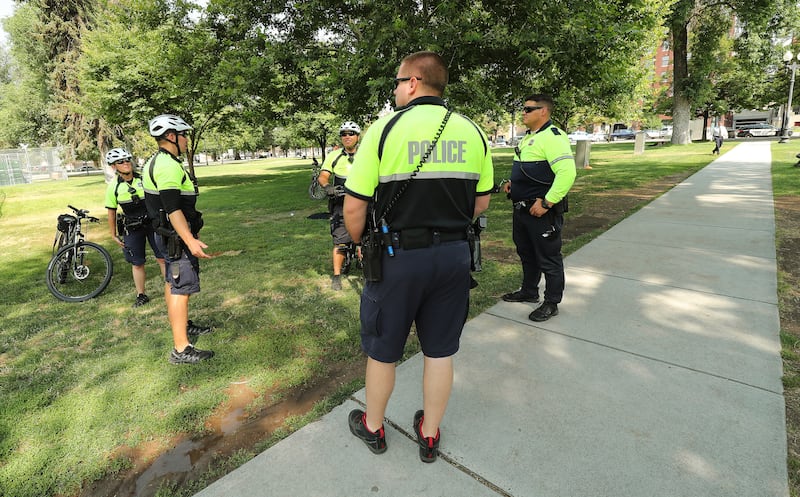SALT LAKE CITY — While crime rose this year in some communities in Utah, including Salt Lake City, U.S. Attorney John Huber noted Thursday that crime in Ogden decreased because of a concerted effort to find and prosecute “apex criminals” who hide among and prey on those people experiencing homelessness.
“This week, I thought it was interesting that I was up in Ogden on Tuesday to celebrate 2 1⁄2 years of good hard work by many people to find those apex criminals in the heart of that city and see if it affected crime rates,” he said, noting they studied where crimes were occurring and targeted enforcement in those areas. “And it certainly did.”
He said violent crime dropped 25%, and crime overall decreased 30% in Ogden due to these collaborative efforts between local and federal law enforcement officers.
“We use federal resources to bring people to federal court where they could get meaningful ramifications, meaningful justice for the wrongs that they’d committed,” Huber said, “and take them out of the community, not for a day, ...not for a week, but for years at a time to give respite to the community, including the homeless community.”
Huber spoke during a “Utah Public Safety Summit,” a virtual panel discussion about law enforcement and crime reduction strategies hosted by the Pioneer Park Coalition. The panel included Utah Commissioner of Public Safety Jess L. Anderson, chairman of The Other Side Academy and bestselling author Joseph Grenny, Utah Transit Authority Police Chief Fredd Ross, former Utah Department of Public Safety Commissioner Keith Squires, and Salt Lake City Police Chief Mike Brown.
The panel was moderated by Mr. David Ibarra, founder of E-Leader Tech and Pioneer Park Coalition board member.
The discussion focused on the challenges law enforcement faces, especially as it relates to crime associated with or near homeless encampments. One member of the public suggested they needed to do more to reach out to communities of color, something most of the panelists agreed needed to happen more often.
There were questions about what is being done to get resources and help to those who want to find a way into more permanent housing, and what can be done about those who just want to live on the streets.
Huber said he didn’t think people had a right to just live on public property, but the reality is there are dozens of camps around the city and county and they cause a myriad of issues for residents, businesses and community officials.
Anderson said he understood why some of those people experiencing homelessness would choose to camp rather than find shelter in one of the available shelters because of the risk of COVID-19 in communal living.
“If I were to go down and start testing every single one of these encampments right now, with the level of positive cases of COVID, that we would find, whether symptomatic or asymptomatic, I guarantee you, it’s there. And if you take that into a ... shelter ... are their concerns real? Absolutely, they’re real.”
He said he understands why those who are older or have underlying health concerns were even more leery.
“I don’t blame them,” Anderson said. “So that’s something to take into consideration.”
He said he saw the vaccine as something that might be helpful as those living in communal situations, like shelters, could be offered that option in the second wave of vaccinations.
When asked what ordinary citizens can do to have a positive impact, Huber said communicate in a real and consistent way with elected representatives and law enforcement.
“If the question is about what can Jane Doe citizen do, or Joe Blow citizen do, is they can make sure that the elected leaders appreciate the struggles that we’re having in neighborhoods and communities,” he said. “Be real constituents, not just sit at home and complain about nobody doing anything. But to get on the phone, hop on the email... now policymakers know what our priorities are.”
Anderson said the state is committed to finding more permanent solutions to the homeless issues, including those concentrated in Salt Lake City.


